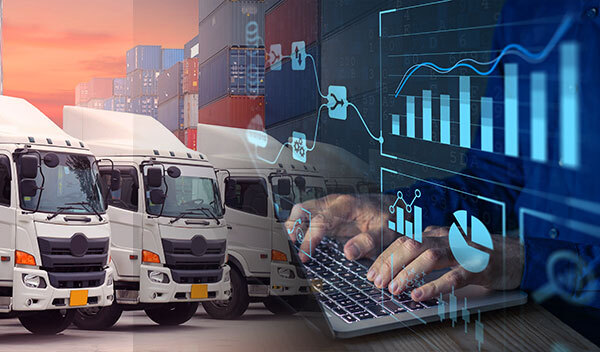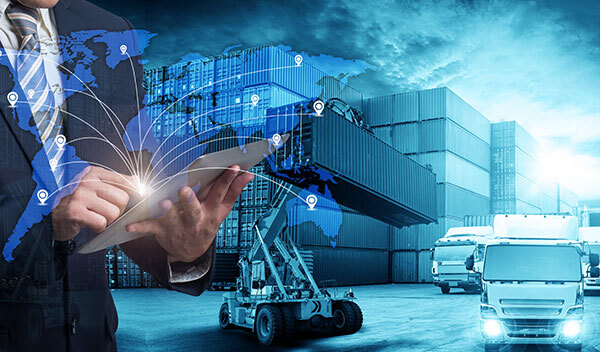Blockchain adoption, in my opinion, is still 50/50. I think it will either eventually be fully accepted or forgotten in the annals of tech history. Nonetheless, it is highly important for a business owner to know the possibilities Blockchain in logistics technology offers in trucking businesses and generally other logistics businesses.
Blockchain in logistics technology can protect you from cyber-attacks, pay unnecessary hidden charges, speed up payments, ensure transparency, eliminate middlemen, increase efficiency, and more.
What is Blockchain Technology in Logistics?
The use of Blockchain in logistics technology involves creating a decentralized public record that tracks all changes in real-time. Hence, using Blockchain in the logistics industry can help companies optimize their delivery routes, eliminate unnecessary steps, reduce errors, and save time. By improving transparency and reducing risks, the Blockchain can help increase trust in the logistics industry. Additionally, Blockchain eliminates the need for intermediaries like banks, which can streamline processes and reduce costs.
Advantages and Impact of Blockchain in Logistics
People think that blockchain technology is only relevant to cryptocurrencies. But that is not the case; Blockchain has numerous applications in different industries, and logistics is no exception.
Some of the most important advantages of using Blockchain in logistics are:
- Transparent & Traceable: One of the best things about this technology is that you can not create copies of an original document. In case you do make copies, you can easily differentiate them from the original. Nothing is hidden from those who have access to your blockchain network. Moreover, all updates are done in real-time, preventing delays. All records, transactions, and bits of data are data stamped and immutably recorded.
- Ensure Quality & Provence: in the transportation business, it is common to see product damage or receive spoiled goods. But thanks to Blockchain in logistics technology, you can easily trace the item back to where it came from, which makes it much easier to return the goods or get a refund. Moreover, people can even be sued for spoiled food or damaged goods. So having such data also protects you from lawsuits. You can even set certain standards for the collection of goods if, for example, a product fails to live up to the set standards; you can tag those goods and set up the return process.
- Use Smart Contracts to Increase Efficiency: Now, smart contracts are online-based self-executing contracts that allow transactions to be completed based on conditions met or milestones. This allows you to automate many tasks, requiring you to hire fewer people and allowing you to maintain more peace when most menial tasks need not be worried about. For example, vegetables are delivered, and payment is automatically transferred to your bank account as soon as the guy receiving the goods has signed off on receiving them. Similarly, any task can be executed on a smart contract, like salaries, office supplies, vehicle maintenance, audits, and more.
- Make Payments Secure: All information on a blockchain is stored on a network of computers rather than a single server making it near impossible for hackers to access all of your information. Moreover, all data is encrypted, so it can not be altered in any way. You can also make the sender and receiver anonymous to prevent targeted cyber attacks. Moreover, you can also use smart contracts as an escrow service to hold money, ensuring transfers on meeting conditions. Blockchain in the logistics industry has a lot of potentials.
Use Cases of Blockchain in the Logistics Industry
There are numerous ways in which blockchain technology can be used to improve the logistics industry. However, currently, not too many companies have adopted the use of Blockchain for logistics. So, the use cases are fewer than the capabilities of the technology. We have compiled a list of important use cases in current times:
Inventory Management
A supply chain often includes many different handlers, each playing a role in the delivery process. Sometimes, it's relatable parts that need to be assembled at a final location. Blockchain in logistics helps you track where each item has been along the way. If there are any disruptions in the supply chain, they are easier and faster to detect.
One example is Maersk; the company uses Blockchain in logistics technology to manage cargo across international borders. The company aims to save millions of dollars worth of man-hours for companies transporting cargo. They hope to reduce errors, detect fraud and improve the time of delivery.
Secure Payments
International payments are simplified thanks to the help of the Blockchain in logistics while also promising transparency and security. Even Visa has launched it's B2B connect payment gateway based on blockchain technology and smart contracts. This helps manage payments and billings.
Product or Goods Verification
Blockchain in logistics helps you establish key indicators of authenticity, one of which is assigning a unique code that is available on a public ledger. This code allows you to verify if what you have is, in fact, the original item, not a copy or a fake.
While a QR code can be manipulated, this can not. This is especially useful for consumers looking to buy luxury items like diamonds or gold. Blockchain helps reduce the anxiety among the parties involved without needing third-party security.
Smart Contract-Based Payments
When conducting business with new companies or offshore companies, you always run the risk of payment defaults. But a smart contract eliminates that risk by putting the money in escrow; the funds are transferred when the agreed-upon conditions are met.
A smart contract is code based and does not require external interference to be executed. Hence, it can pay salaries, bills, and other expenses.
Real Use of Blockchain in the Logistics Industry: Walmart
This multinational retail company has been using blockchain technology to better its supply chain track provenance and transparency. Recently, Walmart asked its spinach and lettuce suppliers to use a database through blockchain technology. Because of this implementation, Walmart can accurately identify where contaminations or problems come from.
This technology ensures safety and accountability. Walmart is better able to guarantee the quality of its products. They are able to save money and, in case of lawsuits, fully or partially shift accountability towards the supplier. For example, if an Ecoli outbreak were to occur, the problem would be detected quickly, and the lot that caused it could be discarded without wasting the entire supplies.
Customers in Walmart can also scan items near their isles to instantly get complete information on them, including their journey from the warehouse to the store and everything in between.
How will Blockchain Transform the Supply Chain and Logistics Industry?
There are numerous advantages of Blockchain in logistics. But the top 4 most important ways of transformation are traceability, payment security, automation, and speed.
The logistics industry can benefit from accurately tracing the source of its products step by step and finding faults accurately. Security of payment, speed, and ease are what blockchain technology offers the supply chain through smart contracts and direct transactions.
The possibilities are endless, but the adoption of this technology has been the main issue. Staff needs to be trained, and digital infrastructure also needs to be established. Moreover, in certain cases, you also need your client and partners to have blockchain technology enabled to make the best use of it.
About the Author: Mubashir Ijaz
Mubasshir Ijaz started his career as a creative writer and digital marketer back in 2016. He has worked under multiple niches and aims to provide readers with a free-flowing, easy-to-understand copy that will provide them with value for their time. He aspires to be a problem solver, and through his extensive writing experience, he aims to provide trucking business owners and employees with informative technological solutions.











